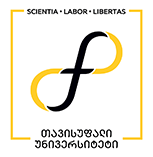PhD in Social and Humanitarian Sciences
23 აპრილი 2018
School: | Doctoral School |
Programme Title: | PhD in Social and Humanitarian Sciences |
Qualification Awarded: |
|
Programme Credits: | 180 ECTS |
Language of Instruction: | Georgian |
Concept of the Programme:
PhD Programme in Social and Humanitarian Sciences at the Doctoral School of Free University of Tbilisi is the third level of Higher Education, implemented in cooperation with other faculties / schools of the University. The main function of the Doctoral School is to provide scientific researches with modern resources, to coordinate doctoral scientific activities and integrate them into modern, global scientific research.
The study component of the PhD Program in Social and Humanitarian Sciences provides PhD students with appropriate methodological preparation and field tools for high quality research. At the same time, PhD program for Social and Humanitarian Sciences is focused on generating the necessary general skills in doctoral students, which is important for a successful career in the current labour market.
The study component of PhD Program in Social and Humanitarian Sciences is 45 ECTS. Curriculum is taught by highly qualified personnel. Apart from research activities, the doctoral students are also involved in the academic process of the university.
Objectives of the Programme:
The goal of the PhD Program in Social and Humanitarian Sciences is to:
- ensure scientific research in social sciences (including international relations, economics) and humanitarian sciences (including philosophy, history, philology);
- integrate researchers into the international scientific community;
- prepare pedagogical staff in social and humanitarian sciences for science and high school;
- enhance scientific work and improve research quality;
- promote new knowledge creation and implementation;
- ensure scientific research for the doctoral thesis, provide academic supervision for it, from the educational process perspective and scientific supervisors, as well as to publically present the thesis and award the doctor's academic degree.
Goals set to achieve by PhD School are to:
- find and organise research with the supervision of a mentor;
- offer methodological and theoretical knowledge required to conduct a high level of research;
- create an appropriate environment for effective work - in particular PhD students should have a work space, computer hardware, library, as well as access to electronic library resources).
PhD Program in Social and Humanitarian Sciences is focused on the development of the necessary skills (innovation, initiative, creativity), which are important for a successful career in the current labour market. PhD students will be able to share their future scientific interests and engage them in new and neighbouring study fields. This is especially important when PhD students are looking for ways to solve complex, interdisciplinary scientific problems in social and humanitarian sciences.
The aim of Free University of Tbilisi is to create an environment for learning, teaching and research at all levels, including at the Doctoral level, which will be the best in Georgia and accessible to young people. University will assist PhD students in creating the best environment for studying in their fields of interest. Thus, the goals of the PhD program are directly compatible with the Mission of the University.
Career Options:
After completion of PhD Program in Social and Humanitarian Sciences, graduates will be able to work as:
- scholars or researchers in private and public projects;
- academic personnel at the university;
- consultant in private and public international organization.
Learning Outcomes:
Disclaimer: hereafter the term “field” references fields of International Relations, Economics, Sociology, Philosophy, Philology or History, depending on the chosen PhD.
After the completion of the PhD Programme, graduates will own general and specific competencies listed below:
Knowledge and Understanding:
Graduates will possess:
- knowledge of the field’s theory and its latest achievements;
- ability to analyse problems of the field and knowledge of the methods necessary for analysis;
- knowledge of modern methods of scientific research in the field;
- knowledge and ability to use achievements of the field and its adjoining sciences;
- ability to create original work in the field and to publish the final research project.
Applying Knowledge to Practice:
Graduates will possess:
- ability to conduct theoretical / qualitative research in the field;
- knowledge and ability to demonstrate methods of higher education in the field;
- ability to transfer field’s knowledge to specialists and the general public;
- ability to advise on the implementation, use and analysis of the theory and practice of the field, its research and theory of practice;
- generate and guide research methodology in the field;
- create and interpret new knowledge in the field through original innovative research;
- develop new skills, techniques, instruments, practical activities and materials in the field;
- planning, implementing and overseeing the research in the field.
Ability to Make Conclusion:
Graduates will have the ability to:
- deeply analyse, synthase and evaluate;
- think abstract;
- independently make decisions in complex situations;
- critically think and self-criticise.
Communication Skills:
Graduates will have the ability to:
- communicate academic knowledge in their native language;
- write and communicate in foreign languages (English);
- act quickly and adapt to a foreign environment;
- perfectly use information and communication technologies.
Ability to Learn:
Graduates will have the ability to:
- retrieve / process/ use information;
- prepare and develop new ideas and processes in learning and activity process, as well as in scientific research, based on the latest achievements.
Values:
Graduates will have the ability to:
- respect and understand different cultures;
- know and share ethical norms in research;
- know the basic principles of professional responsibility and professional ethical behavior;
develop innovative methods to establish values.




